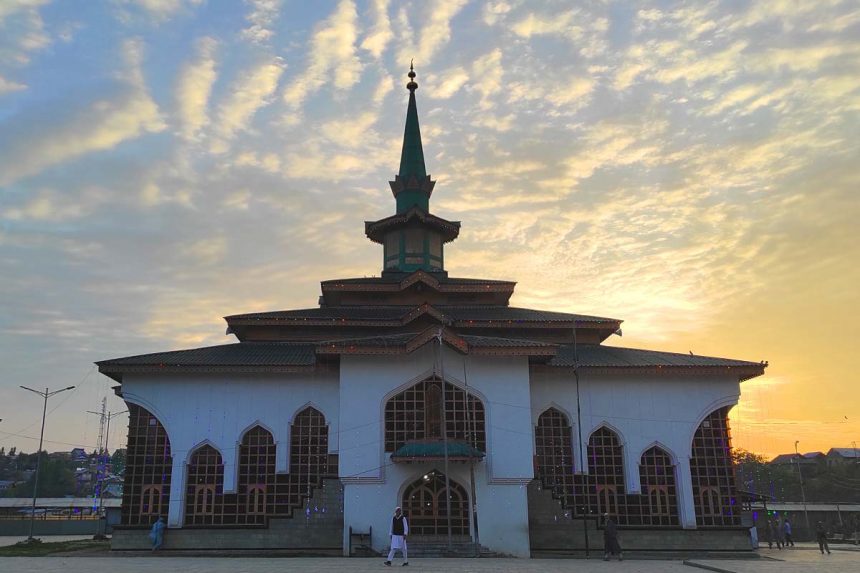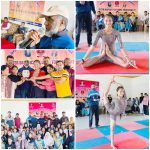“Nund” literally means “beautiful.” Although the word, mostly its derivative, “nund-boun” is profusely applied to the “beauty of appearance,” but it could mean “beauty of thought, word or action” as well. It also stands for “good” or “virtuous” as could be discerned from this line of Shaykh Nuruddin (R‘A): “nund-yan siet khoyi kaer-zay;” that is, “seek the companionship of good (people).” Its derivative, “nund-yow” is used to address someone with a sympathetic tune, and there it means “O dear!” Since a “nund” is expected to nurture noble thoughts, to do noble deeds and to utter noble words, s/he is thus a “wise” human being. Shaykh Nuruddin (R‘A), as a mystic, has addressed his “self” (nafs) as “kand-yow,” meaning thereby “O (my) unwise self!”
Our Shaykh (R‘A) was “Nund” in every respect. Not only was he good-looking but his thoughts, words and deeds were noble and based on wisdom. His religious experience was based on the knowledge which he had internalized. However, he didn’t keep this realization confined to himself. Having quenched his thirst from the fountainhead of real knowledge, the Shaykh (R‘A) externalized it through his word and deed. His renunciation of the world didn’t lead him to self mortification. That is why he championed the cause of moral virtue both on the individual as well as the collective level. This is because he erected the edifice of ethics on the universal principle of “living the life of the people, by the people, for the people” to earn the pleasure of God.
So this people-centric approach of the Shaykh (R‘A) helped him to champion the cause of public morality of his compatriots, both Muslims and non-Muslims, irrespective of their religious considerations. This attitude of the Shaykh (R‘A) vis-à-vis the ethical paradigm of his society gave a soothing touch to the shared moral consciousness which the people in general wanted to live by. People, as such, wholeheartedly emulated the Shaykh’s (R‘A) precepts in letter and spirit as these were shorn of any dry “indoctrinating sermons!” Instead, the Shaykh (R‘A) talked from the pedestal of the “lived reality,” “experienced truth” and “realized worldview!”
By declaring that “I have broken off the machete and made sickle out of it” (kartal phoutrem ti gaermas draete!), the Shaykh (R‘A) actually was pointing out the “redirection” or “reorientation” of his mission which would suit the religious considerations of his compatriots. This was also a silent move against the ostentatious charlatans who had hijacked both morality as well as religion. It was also an announcement of “peaceful indifference” to the ruling class who had also become a cause of corruption for public morality because of their sheer materialism.
As the Shaykh (R‘A) endeavoured for an “overhaul” of the socio-cultural moorings of his people, he hardly needed any support or aid from the rulers whatsoever. It is a fact that throughout the human history, political enthusiasts (read rulers), by and large, have “divided people to rule over them!” Although the division helped them to expand their dominions and prolong their rule, but such rulers were never able to rule the people’s hearts. So, they were always on a hunt to “buy” the docility of their subjects. The Shaykh (R‘A) hardly needed such tactics because, he, to borrow the famous words (with some change) of Pandit Kalhana, “could rule the people’s hearts with the force of his sublime moral character!” This “rule” of the Shaykh (R‘A), however, was meant to bind the people together with the cord of love which he had been an epitome of by dint of his God-oriented life and God-centric teachings.
The Shaykh (R‘A), as such, embarked upon his journey as an “inclusivist” to bridge the socio-cultural gap(s) between the Muslim and non-Muslim sections of his society. Inclusivism, we know, “asserts that there is beauty in the varieties of different schools of thought, and that they can live together in harmony.” As harmony was the pressing need of the Shaykh’s (R‘A) times (and it continues to be so), he addressed both to encourage them to live harmoniously as brethren. There is a series of “shruks” (stanzas) in his poetry which highlight this theme of practical harmony between Muslims and Hindus. Some of these stanzas are summarized below.
paras khiyan karakh toshani,
tawai garas no gatxchi ziyani,
hisab hainai, roz dhiyani,
asal Hiyandi ti Musalmani!
That is, “feed the unknown (guest, wayfarer, indignant) and be happy;
Your possessions will not decrease by doing so;
You will be questioned (regarding your means); so be cautious;
O real, Hindu and Muslim!”
The wisdom underlying these verses is that while feeding the needy, you, O Hindu and Muslim, shouldn’t bother about the material decrease in your possessions. You should in no way hoard or hide things which you possess in abundant measure. You will be questioned vis-à-vis the extra means of sustenance which you have more than others. Morally, you are bound to spend these resources on those sections of the society which are less privileged. Here, one is reminded of the famous saying of Jesus: “For where your treasure is, there your heart will be also!” (Matthew, 6:21)
tati kiyah dihas niyani,
akh kriyih mo kaerith samani,
chhoun sur kariyi yim painthani,
asal Hayindi ti Musalmani!
That is, “what would you take there as a gift (to your Lord)?
You haven’t done anything worth mentioning!
You would have to face the wrath (of your Lord) there!
O real, Hindu and Muslim!”
Here, the Shaykh (R‘A) is advising his people to be true to themselves and to perform such deeds that would be remembered long after they are gone. This is the only way to please their Lord and to have a good reputation among the people after death.
chhu kiyah wobran payi;
abi ami ti mo palzani;
borunh koni loguyi tani;
asal Hiyandi ti Musalmani!
That is, “(there) is no way to escape (from the anger of God);
(Where) help will come neither from the father nor from the mother;
(There) you would have to face condemnation;
O real, Hindu and Muslim!”
Here, the Shaykh (R‘A) is bringing home the fact that we have to pass away and enter such a world where help would come from nowhere. Amid such circumstances, we would be welcomed by nothing other than the displeasure of our Lord if we fail to perform what we, as human beings, are supposed to perform.
budith kriyih kaerith ni haikani;
pati noundi kiyah dami diyani;
sulih koni koruth giyani;
asal Hiyandi ti Musalmani!
That is, “we (humans) can’t do our duty when we come of age;
Why then you, O my dear (wise fellow), don’t do something when you are young (and energetic);
Why don’t you think (about the coming times) a bit early;
O real, Hindu and Muslim!”
By dint of this inclusivism, the Shaykh (R‘A) put forth a kind of “common minimum programme” before his compatriots, both Muslims and Pandits. No doubt, this approach of the Shaykh (R‘A) persuaded both the Muslims as well as the Hindus of his time to form a harmonious society where the principle of “follow one and hate none” became the order of the day. It is this morality model of the Shaykh (R‘A) which made him “Nund” (Wise, Noble, Elegant) as well as “Alamdar” (Standard-bearer) of Kashmiris.
(The author is Sr. Assistant Professor, Islamic Studies at GDC Sogam (Lolab). Feedback: [email protected])






